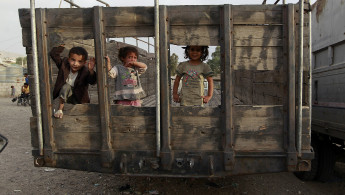World must 'focus on poorest children'
Sharper focus on the most vulnerable would help the children’s agency reach its new global goals for sustainable development, the annual State of the World's Children report maintained.
Progress so far "has mainly been made by focusing a lot on children that are easier to reach, or on interventions on health and nutrition with a high impact," said Justin Forsyth, UNICEF's deputy executive director.
"What we are finding now is that if we do not focus on the most disadvantaged we won't accelerate this progress," he added.
Several gains were recorded, including a 53 percent drop in infant mortality since 1990 and a dramatic reduction in extreme poverty. However without a shift in focus, millions of children could be subjected to humanitarian disasters, the report said.
An estimated 69 million children under the age of five will die from preventable causes while 167 million will suffer from poverty over the next 15 years, UNICEF warned.
A further 750 million women and girls will have been forced into child marriages by 2030, it suggested.
 |
An estimated 69 million children under the age of five will die from preventable causes while 167 million will suffer from poverty over the next 15 years |  |
"We have made tremendous progress," said Ted Chaiban, director of programmes at UNICEF. "But that progress has not been fair," citing findings that revealed children from poor backgrounds are twice as likely to die before they turn five and fall into chronical malnourishment as those from richer parts of the world.
Babies born to uneducated mothers across much of South Asia and sub-Saharan Africa are almost three times more likely to die before they are five, than those born to mothers with a secondary education.
Likewise, girls from the poorest households are twice as likely to be forced into child marriage as those from the wealthiest households.
 |
Girls from the poorest households are twice as likely to be forced into child marriage as those from the wealthiest households |  |
The report also revealed a sharp decrease in children out of school since 2011.
Around 124 million children today who do not attend primary or middle school and can only be reversed by pumping education to reaching the most vulnerable, Chaiban argued.
"Where there has been a strong investment in basic education around the world, there has been a tremendous return on investment," he said.
Chaiban said in addition to youngsters fleeing poverty and inequality, there are also more children living in conflict areas – 250 million, and 30 million are displaced.
With no action to address inequality, societies worldwide will feel "a dramatic impact and it will fuel instability," Forsyth said.
UNICEF called on all 193 UN member states to develop national plans that put the most disadvantaged and left behind children first and set specific goals to close gaps between the richest and poorest.
Forsyth said up to 147 million children between one- and five-years-old could be saved from preventable death "just with a two percent increase in expenditure in 74 countries."
 |
Up to 147 million children between one- and five-years-old could be saved from preventable death just with a two percent increase in expenditure in 74 countries |  |
UNICEF also has evidence that every dollar spent on vaccinations for the most disadvantaged children "can generate $16 dollars in terms of economic returns."
Agencies contributed to this report



